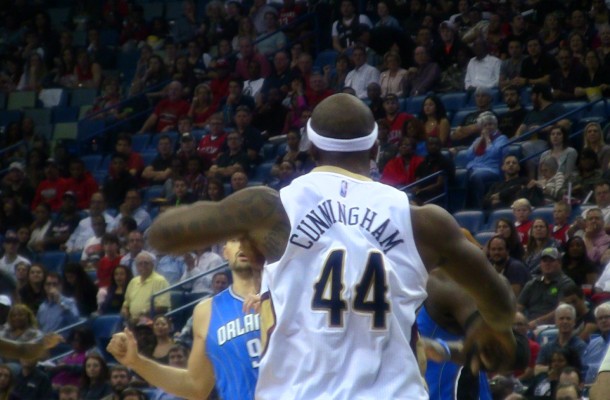« Jrue Holiday Officially Re-Signs with the New Orleans Pelicans
The Pelicans’ Glass Salary Ceiling »
Leveraging a Sign and Trade of Dante Cunningham

The New Orleans Pelicans have not acquired a new player other than Darius Miller, likely on a minimum deal. Part of this is the slower pace of the offseason, and part of it is the Pelicans’ lack of assets while hunting for a certain kind of player of value. I wrote about nonguaranteed contracts last week as a possibly underappreciated asset. Here is another.
Dante Cunningham and Donatas Motiejunas are the Pelicans’ own free agents. They have Dante’s Full Bird Rights, while they have Motiejunas’ Non-Bird Rights. They can use these or other exceptions to sign those players, though Non-Bird Rights are quite limiting in terms of salary range. They can also be used to initiate a sign-and-trade transaction on either player.
To do a sign-and-trade of Dante, for instance, he could be sent to a team for, say, $5m in the first season. I use this figure as an upper bound based on the Patterson deal in OKC. Because of a wrinkle in sign-and-trade deals called “base year compensation,” his outgoing salary would be viewed as his prior contract value of $2,978,250. This would allow the Pelicans to take back $5,311,937 back. Unless he gets a first year salary that is about double his prior salary, so, about $6m, this is the return. I consider this unlikely, but if it happened, his base year compensation would be half the new salary. I also am ignoring the case where his salary is about the same as last season’s, as it seems unlikely. So, he can be used to take on a Taxpayer MLE kind of salary back in trade.
If they send out some nonguaranteeds with him (or other players, too), however, there are two options. One is that Dante can be used to take back up to a $5.3m package, as noted above, and the nonguaranteeds can be used to bring back a package of up to about $8m in total. The other option is to aggregate the salaries, which would allow the Pelicans to take back a package, of up to about $12.5m, including a single player. This can be further increased as other players are included, but, it would have to work out basketball-wise for deals to get done, not just on paper. Without aggregation, the types of packages that come back are more restricted, even if the total value is about the same. The punchline is a big contract can come back rather than collections of smaller ones, all while leaving the MLE intact.
So, with the right incentives such as a pick, the willingness to take on long-term salary, and the offering up of nonguaranteed contracts that can be used to reduce the salary of the receiving team or can be sent out again, the Pelicans may be able exploit the fact that cap room is vanishing and that some teams are looking for defensive glue guys.
The receiving team would need to be willing to live with a hard cap, want Dante and assets, and be willing to part with a difference maker, perhaps along with some . . . inconvenient contracts . . . to help them get over the loss.
Motiejunas’ situation makes him far less useful since his salary would be so small, but it is conceivable he could be used in such a transaction. Dante’s Bird Rights and prior year’s salary are what make this worth even considering.
This is just another option. Sign-and-trades are rare, though more will happen as cap room vanishes, and sign-and-trades with aggregation are extremely rare. However, Dell is known for being creative in deals, so maybe this is in the toolbox.




